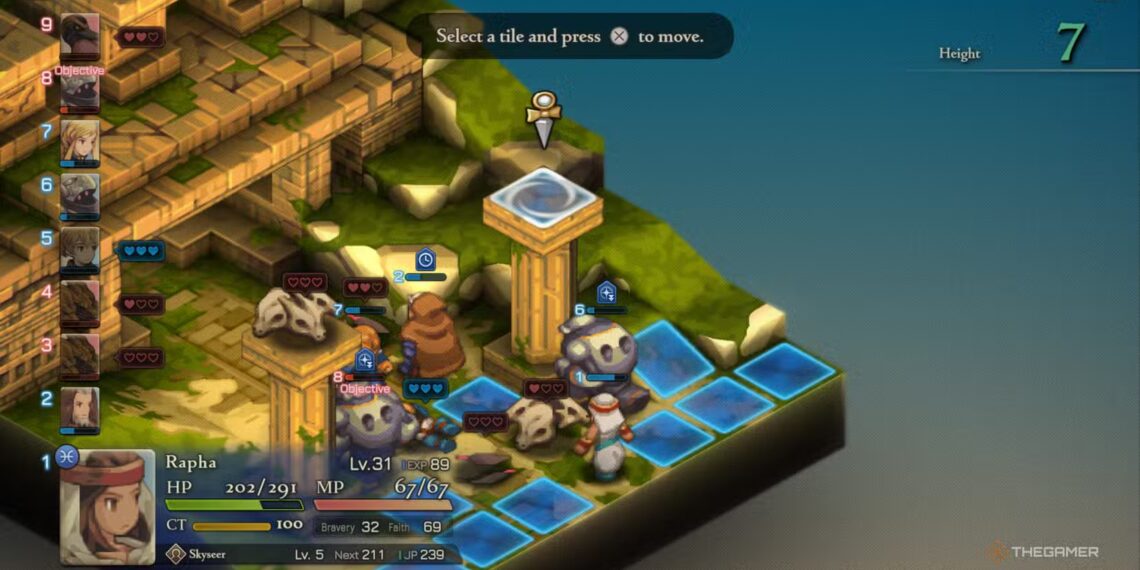Select Language:
Bravery and Faith are two stats you’ll see on every character and unit in Final Fantasy Tactics: The Ivalice Chronicles. They aren’t part of the main story, and their detailed explanations are tucked away in tutorials some players might miss, making them a bit confusing. However, they are just as important as other stats.
If you want to tackle the toughest challenges in the game, understanding how these two stats work and how to manipulate them is crucial. Here’s a complete guide to Faith and Bravery.
What Is Bravery?
Bravery is a number between 0 and 100 that influences three main things:
- The chance of reaction abilities triggering. This chance is shown as a percentage.
- The damage dealt by certain weapons, like Knight Swords and fists. Higher Bravery means more damage.
- The treasure found when using the Chemist’s Treasure Hunter ability.
Generally, it’s best to keep Bravery as high as possible. A high Bravery level means units are more likely to trigger reaction abilities, which is especially helpful for characters relying on reactions like First Strike or Mana Shield to avoid damage.
Having a low Bravery score can cause problems:
- Units with less than 16 Bravery might threaten to leave the party after battles.
- Bravery under 10 automatically turns units into chickens, causing them to flee on their turns—this even happens at the start of battles.
- Bravery below 6 can cause units to leave permanently.
Treasure Hunting
When a character uses the Treasure Hunter ability to find treasure, understanding this mechanic is helpful. Each map contains tiles with hidden goodies—either common or rare items.
- The chance to find a common treasure equals that character’s Bravery percentage.
- The chance for a rare item is 100 minus their Bravery percentage.
So, if you want better chances at rare items, it’s smarter to use a character with low Bravery as your Treasure Hunter. Adding the Chemist’s Treasure Hunter ability increases the chances of rare finds regardless of Bravery.
Many players recommend Rapha as the ideal Treasure Hunter because she starts with low Bravery. If you’re not planning to use her in combat, she’s a good choice for treasure hunting. Still, since she makes a strong mage, you might prefer hiring a dedicated Treasure Hunter and lowering their Bravery manually.
How To Raise and Lower Bravery
You can change your Bravery by using specific skills:
To increase Bravery:
- Use Steel, a Squire ability from Ramza, which boosts Bravery by five.
- Use Praise from the Orator class, raising Bravery by four (though it can miss).
- Get attacked in battle and trigger the Bravery Boost reaction from the Dancer class, which adds three.
To decrease Bravery:
- Use Chicken, a Templar ability from Beowulf, reducing Bravery by 50.
- Use Trepidation from Mystic class, dropping Bravery by 30.
- Use Intimidate from the Orator class, which lowers it by 20.
Significant changes in Bravery during battle are semi-permanent: for every four points added or lost during combat, one point becomes permanent. For example, if Ramza raises his Bravery by 20 in battle through Steel, his permanent Bravery will increase by four points afterward. The same applies when lowering Bravery.
The maximum Bravery a unit can have is 97, and the minimum is 3. However, a very low Bravery score (around 3) would cause the unit to abandon you unless it’s Ramza.
Factors Affecting Bravery
Certain game choices can impact Bravery:
- At Mandalia Plains, choosing to destroy the Death Corps instead of saving Argath grants all units +10 Bravery and 2 permanent points. But in a future battle, Ramza loses 10 Bravery after a conversation.
- Saving Argath at Mandalia does not give a Bravery boost immediately but earns Ramza 10 Bravery later.
- Destroying goblins at Araguay Woods gives your team +10 Bravery, while saving Boco makes the battle harder without giving extra Bravery.
- Saving Mustadio at Zaland Fort grants +10 Bravery, compared to +5 if you choose differently.
What Is Faith?
Faith is a stat dedicated to magic, ranging from 0 to 100. Like Bravery, higher Faith influences:
- Higher damage when casting offensive spells, but these spells also do more damage to the caster.
- More accurate magic spells, but less chance to evade spells.
Having a very high Faith (over 95) makes a unit likely to leave after battles. Once a character hits 95 Faith permanently, they will leave the party at the end of the fight.
How To Raise and Lower Faith
There are fewer ways to adjust Faith compared to Bravery:
- Use Preach from the Orator class to increase Faith by four points.
- Trigger a Bard’s Faith Boost reaction, which raises Faith by three when struck by magic.
- Use Enlighten from the Orator class to decrease Faith by 20 points.
Large changes in Faith are semi-permanent. Every 4-point increase or decrease during battle becomes a permanent change: Preach will increase a unit’s Faith by one point after each use, and Enlighten will decrease it by five.
Faith and Atheist
Two status effects temporarily modify Faith:
- Faith sets a unit’s Faith to 100, making them great mages but vulnerable to magic attacks. You can give this to your mages or enemies to weaken or strengthen their spells.
- Spells like Mystic’s Belief or Templar’s Faith, or the Rod of Faith, can give units Faith.
- Atheist sets Faith to zero, making units weak in magic but resistant to spells.
- Mystic’s Disbelief and Templar’s Doubt spells, or Gokuu Pole, can inflict Atheist.
These effects only last during battles and do not permanently change a unit’s actual Faith level.







